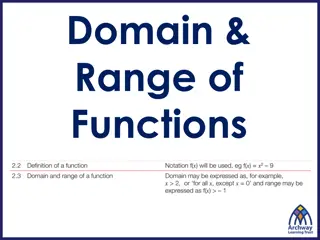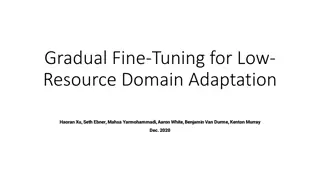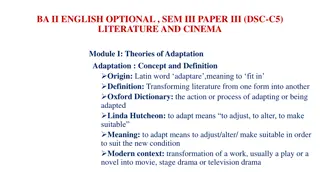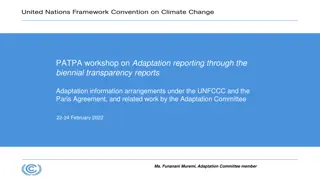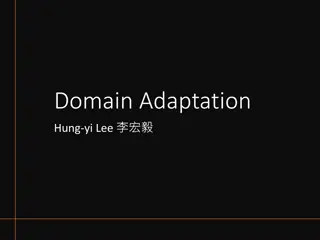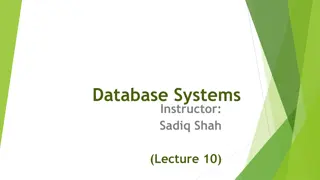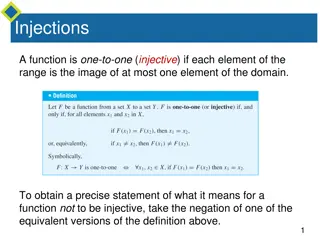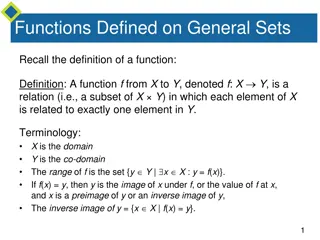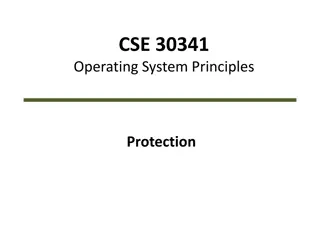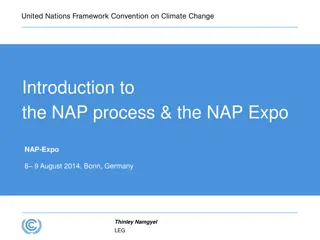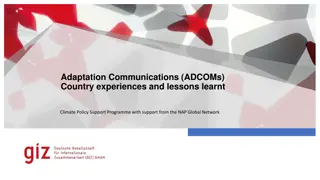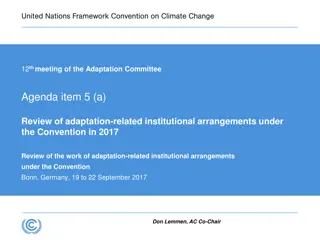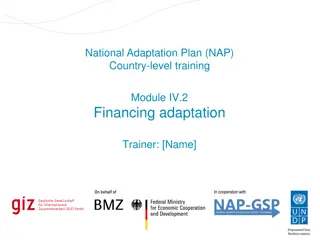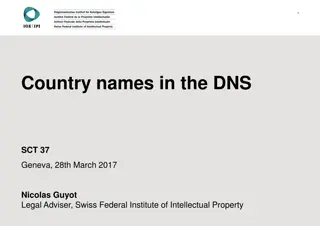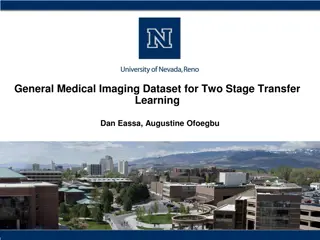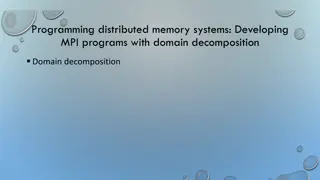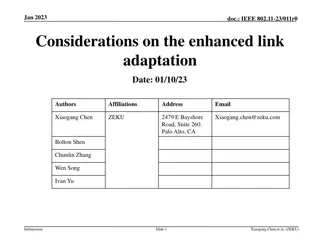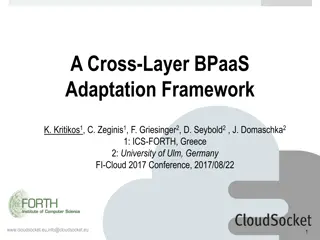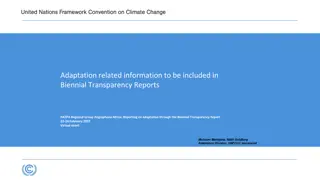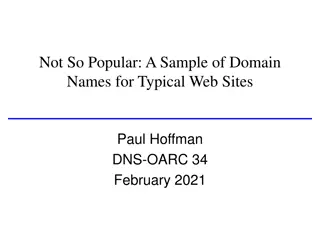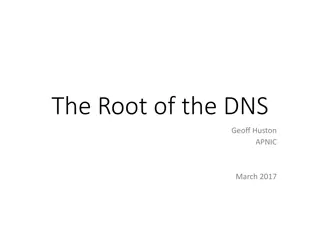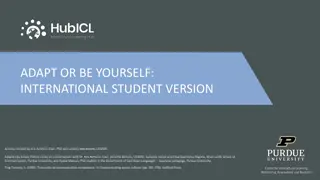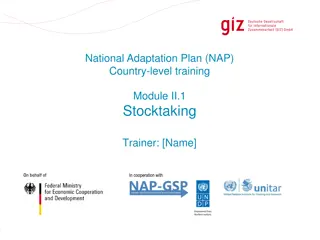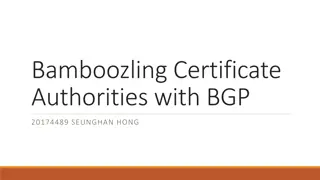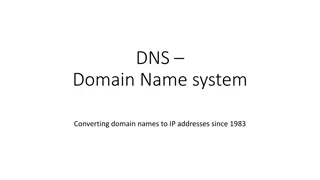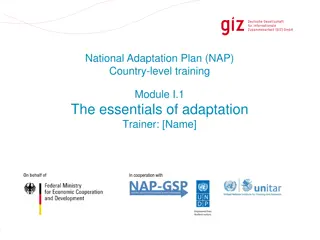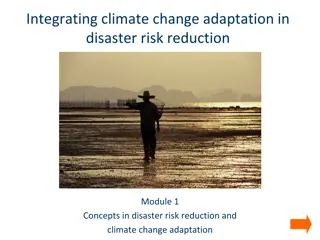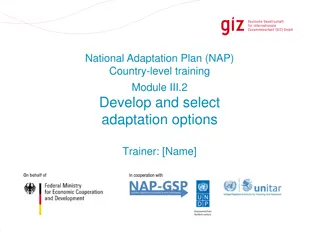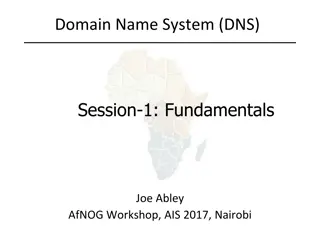Understanding the Urgency of Adaptation Planning and Financing for Climate Change
Exploring the critical need for adaptation planning and financing through National Adaptation Plans (NAPs) and Nationally Determined Contributions (NDCs) to address the adverse impacts of climate change. The content highlights the gaps, challenges, and the widening finance deficit in developing coun
2 views • 21 slides
Understanding Domain and Range of Functions
Understanding functions involves exploring concepts such as domain, range, and algebraic inputs. This content covers topics like constructing functions, common functions like quadratic and trigonometric, and solving functions based on given domain and range. It also provides practice questions to te
1 views • 21 slides
Gradual Fine-Tuning for Low-Resource Domain Adaptation: Methods and Experiments
This study presents the effectiveness of gradual fine-tuning in low-resource domain adaptation, highlighting the benefits of gradually easing a model towards the target domain rather than abrupt shifts. Inspired by curriculum learning, the approach involves training the model on a mix of out-of-doma
0 views • 17 slides
Theories of Adaptation in Literature and Cinema
The concept of adaptation involves transforming literature from one form to another, such as from a play or novel into a movie or television drama. Various approaches and theories of adaptation exist, including perspectives from theorists like Linda Hutcheon, Bela Balazs, and Andre Bazin. These theo
0 views • 9 slides
Workshop on Adaptation Reporting under the UNFCCC and Paris Agreement
Workshop on Adaptation Reporting through the Biennial Transparency Reports and related work by the Adaptation Committee under the UNFCCC and the Paris Agreement, focusing on arrangements for reporting and communicating adaptation information. The workshop covers various initiatives, guidelines, and
0 views • 7 slides
Exploring Adaptations of Reef Specialists
Delve into the evolution and adaptation of reef specialists in Lesson 5 of Coral Oceans at Home Science for ages 11-14. Discover specific adaptations used by coral reef species, the necessity of adaptation for survival, diverse adaptation strategies on the reefs, and create the ultimate coral animal
0 views • 20 slides
Understanding Domain Adaptation in Machine Learning
Domain adaptation in machine learning involves transferring knowledge from one domain to another. It addresses the challenge of different data distributions in training and testing sets, leading to improved model performance. Techniques like domain adversarial training and transfer learning play a k
0 views • 16 slides
Understanding Integrity Constraints in Relational Database Systems
Integrity constraints play a crucial role in maintaining the accuracy and integrity of data in a database. They include domain constraints, entity integrity, and referential integrity, each serving a specific purpose to ensure data consistency and reliability. Domain constraints ensure values in a c
0 views • 12 slides
Understanding Injective and Surjective Functions
Injective functions map elements from the domain to the range uniquely, while surjective functions ensure every element in the co-domain has a corresponding element in the domain. The negation of injective means finding x1 and x2 in the domain with the same function value but not equal, whereas for
1 views • 26 slides
Understanding Functions: Definitions and Arrow Diagrams
Recall the definition of a function, where each element in the domain is related to exactly one element in the co-domain. Arrow diagrams can visually represent functions from finite sets X to Y. In this example, a function is defined from X = {a, b, c} to Y = {1, 2, 3, 4} using arrow diagrams, showc
8 views • 28 slides
Gender and Climate Change in Agriculture: Impacts and Adaptation Strategies
This workshop explores the intersection of gender and climate change in agriculture, emphasizing the importance of considering gender dynamics in adaptation planning. It covers the effects of climate change on men and women in agriculture, reasons for gender-sensitive adaptation planning, global and
0 views • 10 slides
Understanding Operating System Protection Principles
Explore the goals, principles, and implementation of protection in computer systems, including access matrix, domain structure, and capability-based systems. Learn how protection domains and access control are used to specify resource access, and delve into the concept of least privilege and dynamic
4 views • 21 slides
Climate Change Adaptation Programming Strategy and Priorities
This content discusses the Climate Change Adaptation programming strategy, goals, and thematic priorities for vulnerable developing countries. The strategy aims to increase resilience to climate change impacts through long-term measures, strengthen capacities, and integrate adaptation into policies
2 views • 6 slides
Understanding the National Adaptation Plan Process
The National Adaptation Plan (NAP) process, established in 2010, aims to help Least Developed Countries (LDCs) formulate and implement NAPs to address medium- and long-term adaptation needs. Guidelines for NAP formulation and implementation have been provided, with a focus on reducing vulnerability
0 views • 11 slides
Understanding Adaptation Communications in Climate Policy Support Programs
Adaptation Communications (ADCOMs) play a crucial role in the implementation of the Paris Agreement by enabling countries to report on their adaptation priorities, plans, and support needs without burdening developing country Parties. ADCOMs serve to enhance visibility, strengthen adaptation actions
2 views • 13 slides
Review of Adaptation-Related Institutional Arrangements Under the Convention in 2017
The 12th meeting of the Adaptation Committee in Bonn, Germany, focused on reviewing adaptation-related institutional arrangements under the Convention in 2017. Recommendations were made to enhance coherence and respond to the evolving needs of Parties, including assigning future work to existing ins
0 views • 4 slides
The Role of the Adaptation Committee in Promoting Adaptation Technologies
The Adaptation Committee serves as an advisory body focusing on enhancing adaptation actions under the Convention. It aims to provide support, share information, promote synergy, and offer recommendations to incentivize adaptation actions. The committee's ambitious three-year work plan includes acti
0 views • 7 slides
Cultural Adaptation: Understanding Culture Shock and the Adaptation Process
Cultural adaptation involves facing culture shock when living abroad, experiencing various symptoms like homesickness and conflict, understanding cultural variations in body language and perceptions, and going through stages of adaptation from fun and excitement to biculturalism. Tips and insights a
0 views • 17 slides
Understanding Climate Financing for Adaptation: NAP Country-Level Training
Explore Module IV.2 on financing adaptation in National Adaptation Plans (NAP). Learn about tracking climate financing, determinants of financing strategies, potential funding sources, and activities that require funding for adaptation. Discover the Climate Public Expenditures and Institutional Revi
0 views • 17 slides
Country Names in the Domain Name System (DNS)
The Domain Name System (DNS) plays a crucial role in attributing top-level and second-level domains to country names. This system is global and managed by ICANN, not national offices, allowing for unique attribution to one person. Examples of country names registered as second-level domains are prov
0 views • 7 slides
Hierarchical Attention Transfer Network for Cross-domain Sentiment Classification
A study conducted by Zheng Li, Ying Wei, Yu Zhang, and Qiang Yang from the Hong Kong University of Science and Technology on utilizing a Hierarchical Attention Transfer Network for Cross-domain Sentiment Classification. The research focuses on sentiment classification testing data of books, training
0 views • 28 slides
General Medical Imaging Dataset for Two-Stage Transfer Learning
This project aims to provide a comprehensive medical imaging dataset for two-stage transfer learning, facilitating the evaluation of architectures utilizing this approach. Transfer learning in medical imaging involves adapting pre-trained deep learning models for specific diagnostic tasks, enhancing
0 views • 16 slides
Developing MPI Programs with Domain Decomposition
Domain decomposition is a parallelization method used for developing MPI programs by partitioning the domain into portions and assigning them to different processes. Three common ways of partitioning are block, cyclic, and block-cyclic, each with its own communication requirements. Considerations fo
0 views • 19 slides
Enhancements in Link Adaptation for IEEE 802.11 Standards
Discussions in the Jan. 2023 document focus on enhanced link adaptation considerations for IEEE 802.11 standards, particularly in 11be and 11ax. Various improvements and challenges in link adaptation are highlighted, emphasizing the need for enhanced link adaptation (ELA) to address issues like inte
0 views • 14 slides
Understanding Cross-Domain Policies in Web Application Security
This content explores various aspects of cross-domain policies in web applications, including the Same-Origin Policy for JavaScript and Flash, their importance in protecting user data, potential risks of bypassing these policies, and the implications of trusting Flash content to read data from exter
0 views • 64 slides
Wyoming Eminent Domain Laws - Legal Updates and Negotiations
Wyoming Legislative Changes to Eminent Domain Laws outline the requirements for exercising eminent domain, including proof of public interest and necessity, diligent negotiations, and proper notification to property owners. The laws also emphasize the importance of good faith negotiations and fair c
0 views • 9 slides
A Cross-Layer BPaaS Adaptation Framework Overview
This framework addresses the problematic issues of flexibility and cost reduction in Business Processes as a Service (BPaaS) by monitoring and adapting BPaaS in a cross-layer manner. It focuses on handling the entire lifecycle of BPaaS and covers adaptation mechanisms for different layers in the clo
0 views • 17 slides
Reporting on Adaptation in Biennial Transparency Reports: Insights from Anglophone Africa
Explore the integration of adaptation-related information in Biennial Transparency Reports for Anglophone Africa, presented during a virtual event. Learn about key guidelines, criteria, and potential synergies between National Adaptation Plans and Biennial Transparency Reports to enhance effectivene
0 views • 10 slides
Understanding Domain Names for Authoritative DNS Servers
Researchers need to accurately define the types of authoritative DNS servers they sample when measuring server properties. This study focuses on collecting domain names used for web servers to assess typical domain name characteristics, highlighting the importance of accurate data for research purpo
0 views • 7 slides
Understanding the Domain Name System (DNS) Structure
The Domain Name System (DNS) is a distributed data collection utilizing a delegation hierarchy to reflect the hierarchical structure of domain names. This system resolves DNS names by discovering information through iterative searches, starting from the root zone. The process involves querying serve
0 views • 25 slides
Understanding Adaptation Across Cultures
Explore the concept of adaptation in diverse cultural contexts, discussing the importance of adapting, decision-making processes, and the impact of adaptation. Engage in introspective activities to enhance transcultural communication competence. Derived from Ting-Toomey's work, delve into personal e
0 views • 38 slides
National Adaptation Plan (NAP) Stocktaking Training Overview
This training module provides insights into the importance of stocktaking in the National Adaptation Plan (NAP) process. Participants will learn about different stocktaking methods, utilizing stocktaking results for NAP development, and identifying gaps and needs. The session covers subjects like po
0 views • 14 slides
Securing Domain Control with BGP Attacks and Digital Certificates
Exploring the vulnerabilities of domain control verification in the context of BGP attacks and the role of digital certificates in ensuring security. The process of domain control verification, issuance of digital certificates by Certificate Authorities (CAs), and the significance of Public Key Infr
0 views • 53 slides
Exploring the Classic Blocks World Domain
Discover the classic blocks world domain, starting with the BW domain file and solving problems using planning domains. Learn about predicates, constants, and actions to manipulate objects effectively within the domain.
0 views • 10 slides
Evolution of Domain Name System (DNS) Since 1983
Domain Name System (DNS) has played a crucial role in converting domain names to IP addresses since its inception in 1983. This system has revolutionized the way we navigate the internet, translating human-readable names into machine-readable IP addresses. The distributed and hierarchical nature of
0 views • 23 slides
Essential Training on National Adaptation Planning
This training module focuses on enhancing understanding and capacities for National Adaptation Planning (NAP) processes. It covers the basics of climate change, adaptation concepts, challenges, and the importance of adaptation for development. Through interactive sessions and case studies, participa
0 views • 16 slides
Integrating Climate Change Adaptation in Disaster Risk Reduction Module 1
Welcome to the e-Learning module on integrating climate change adaptation in disaster risk reduction. This module covers concepts in disaster risk reduction and climate change adaptation. It is part of a package that includes five modules focusing on vulnerability, disaster risk reduction, climate c
0 views • 29 slides
Climate Change Adaptation Programming Strategies and Priorities
This content discusses the Global Environment Facility's (GEF) programming for climate change adaptation, focusing on strategies, funding sources, and thematic priorities. It outlines the goals, objectives, and core pillars of adaptation programming, emphasizing the integration of climate change ada
0 views • 11 slides
Developing and Selecting Adaptation Options in National Adaptation Plans: A Training Module
This training module focuses on the importance of selecting and prioritizing adaptation options in the National Adaptation Plan (NAP). It covers different assessment approaches, criteria for selecting options, decision support tools like Cost-benefit Analysis (CBA), and the necessity of prioritizing
0 views • 15 slides
Understanding Domain Name System (DNS) Fundamentals
The Domain Name System (DNS) is a crucial component of the Internet, facilitating the conversion of human-readable domain names into IP addresses. This session covers the basics of DNS, the need for names in computing, challenges of the old HOSTS.TXT system, the distributed nature of DNS, its hierar
0 views • 29 slides

